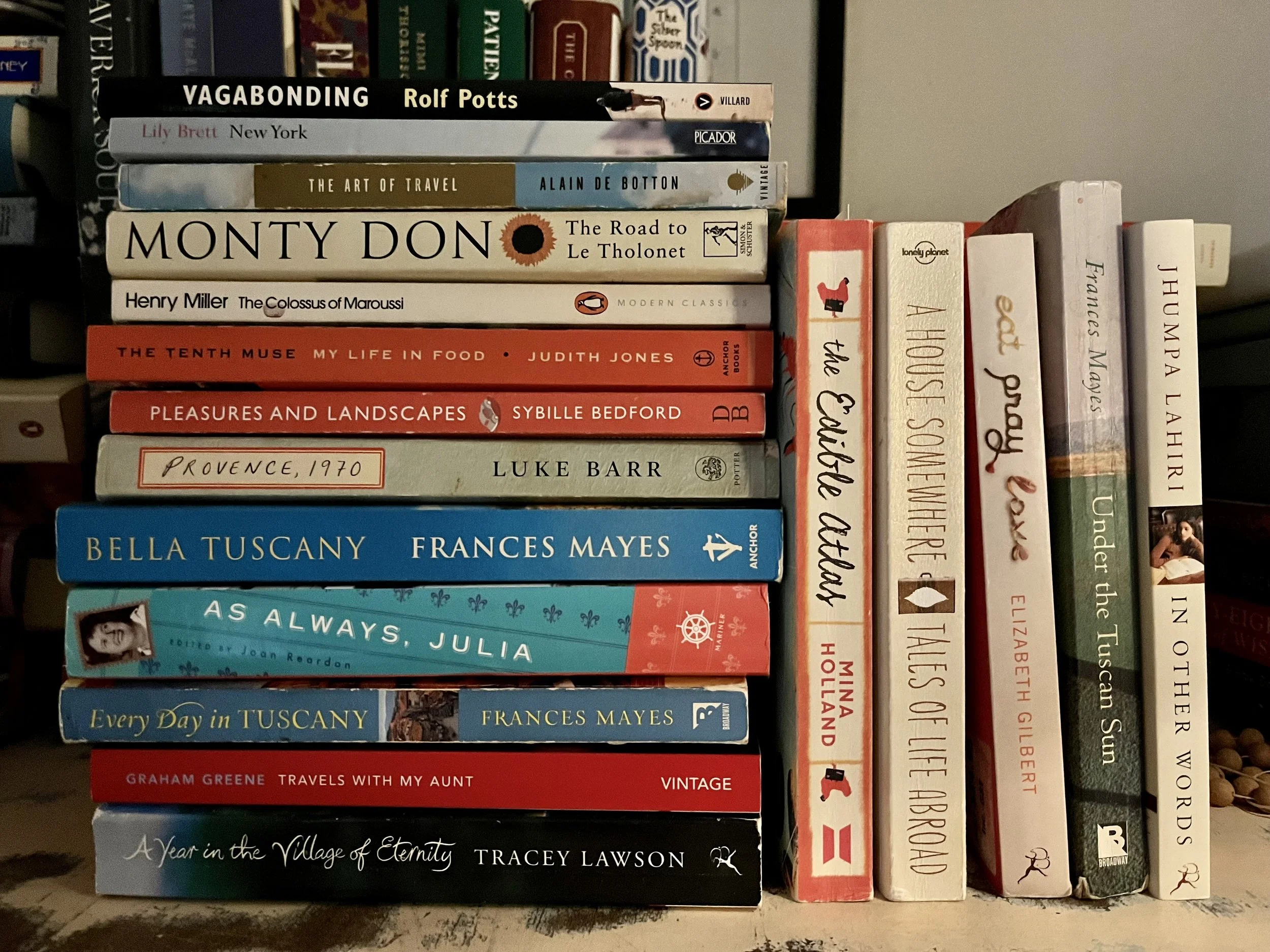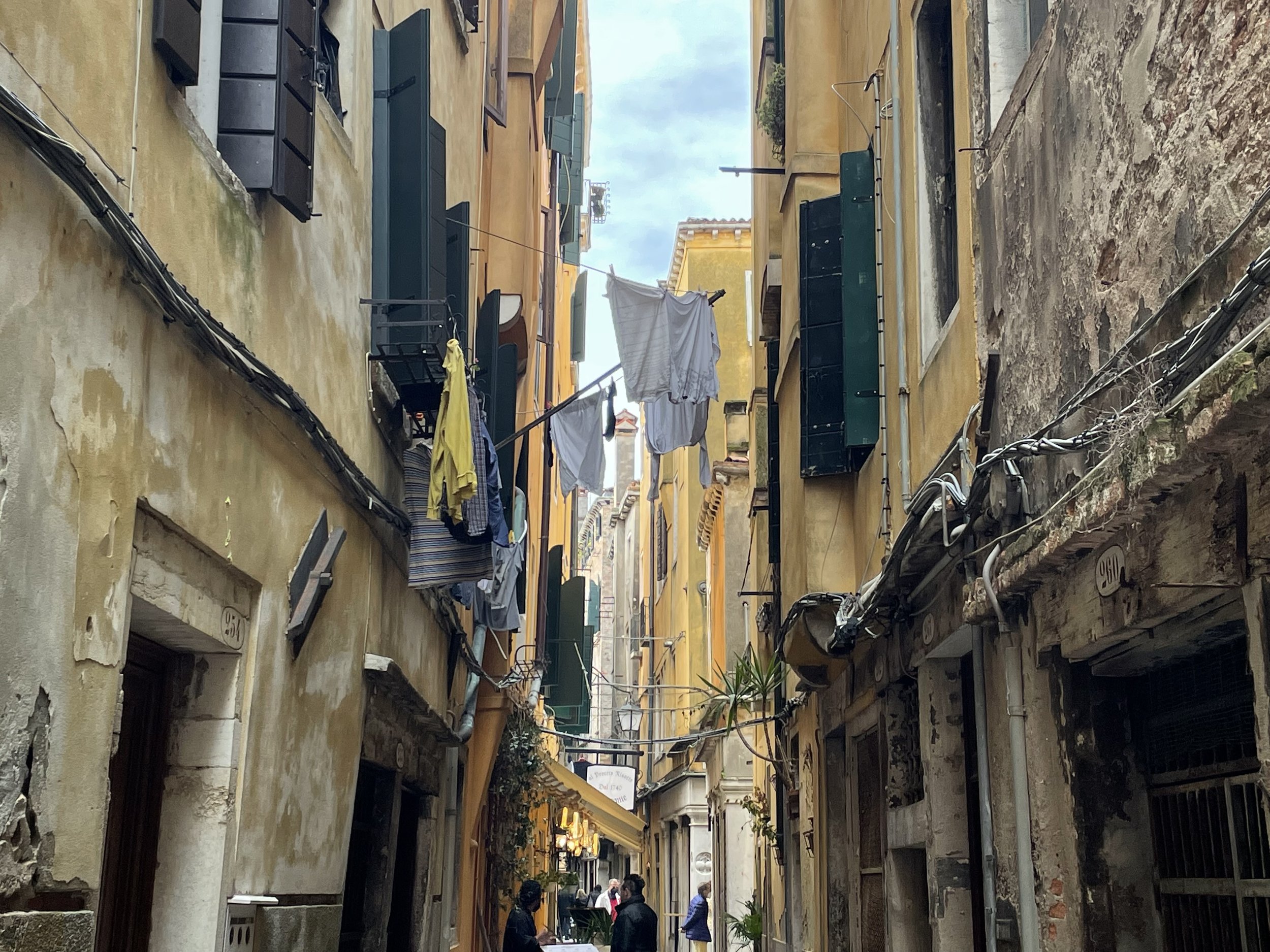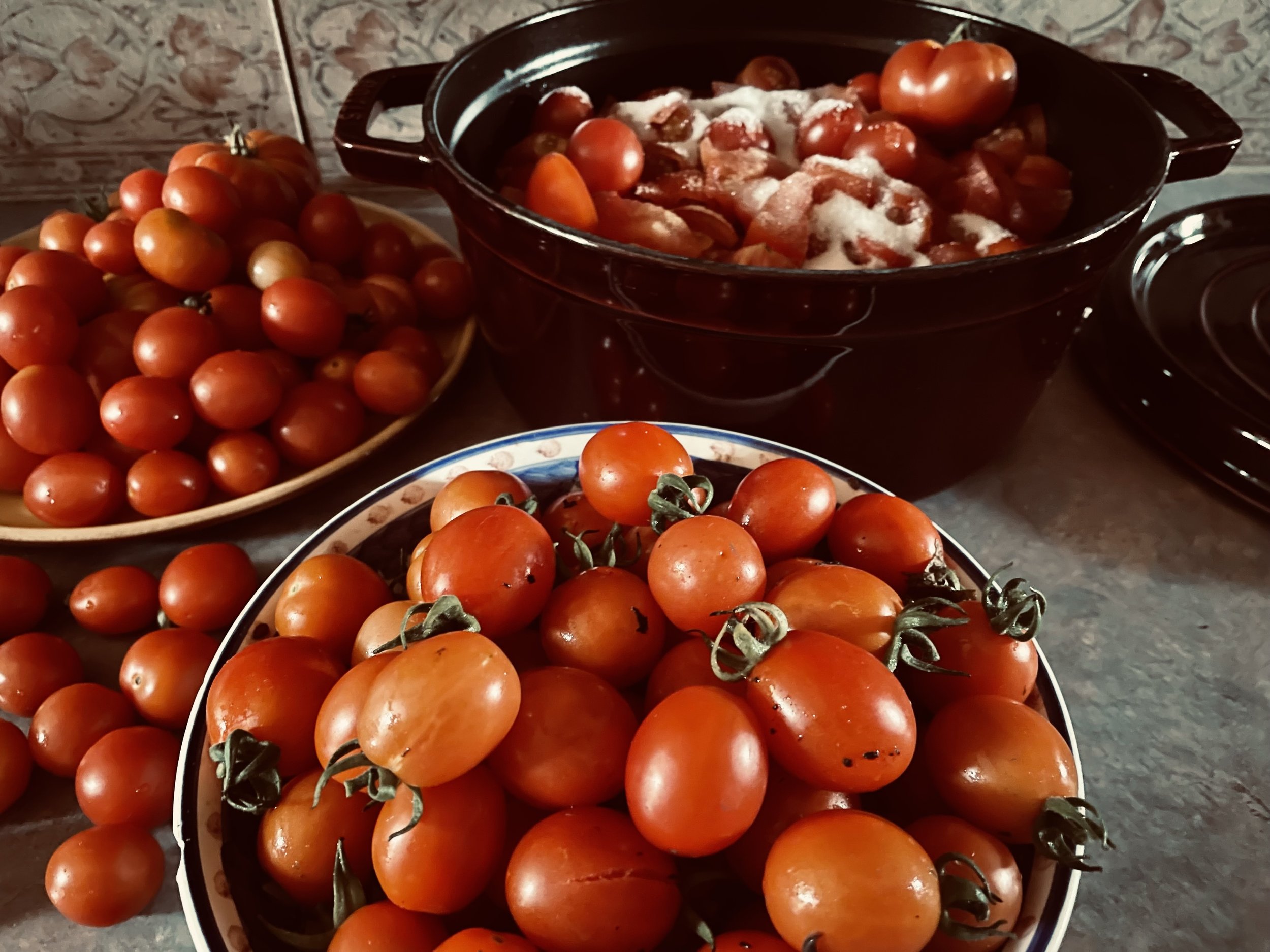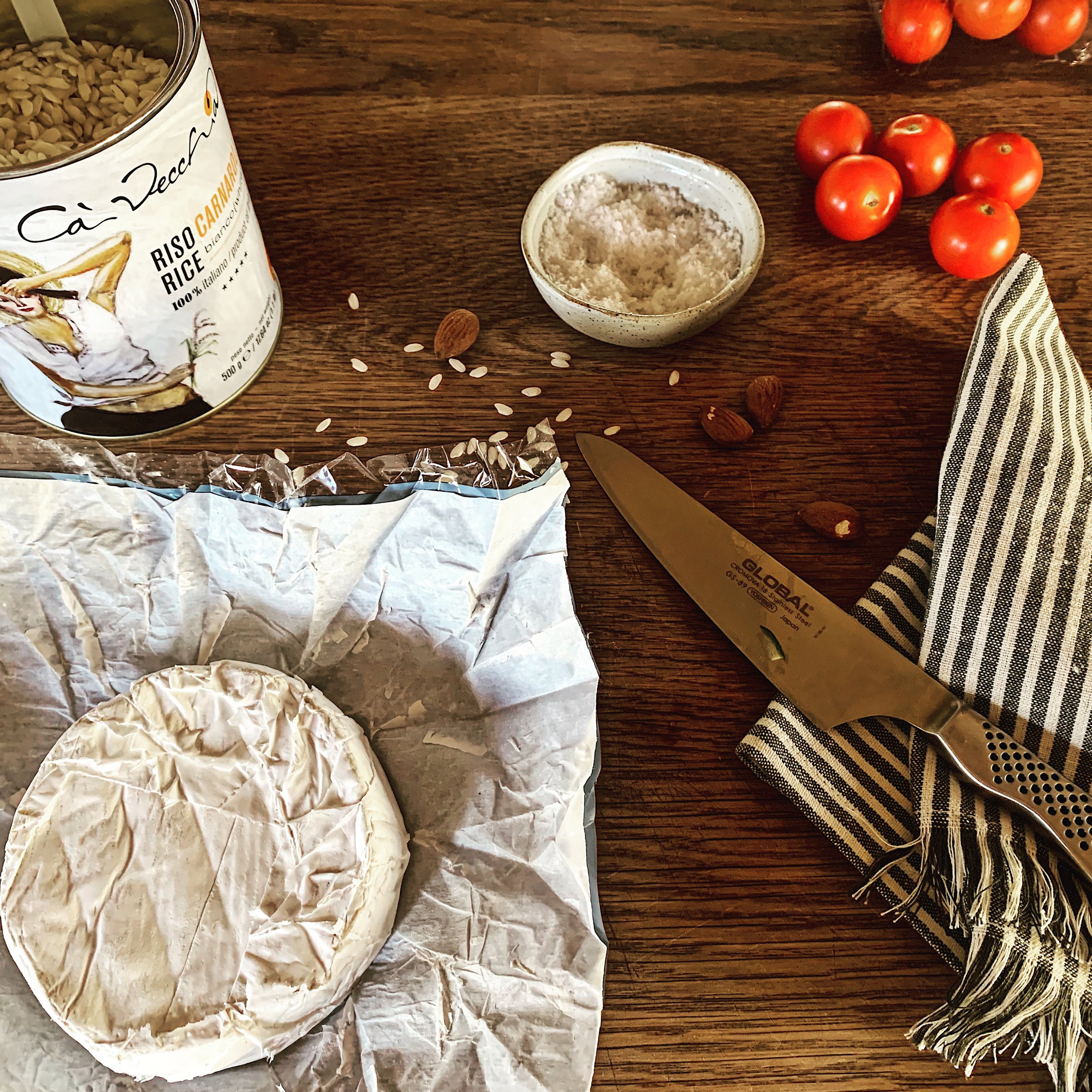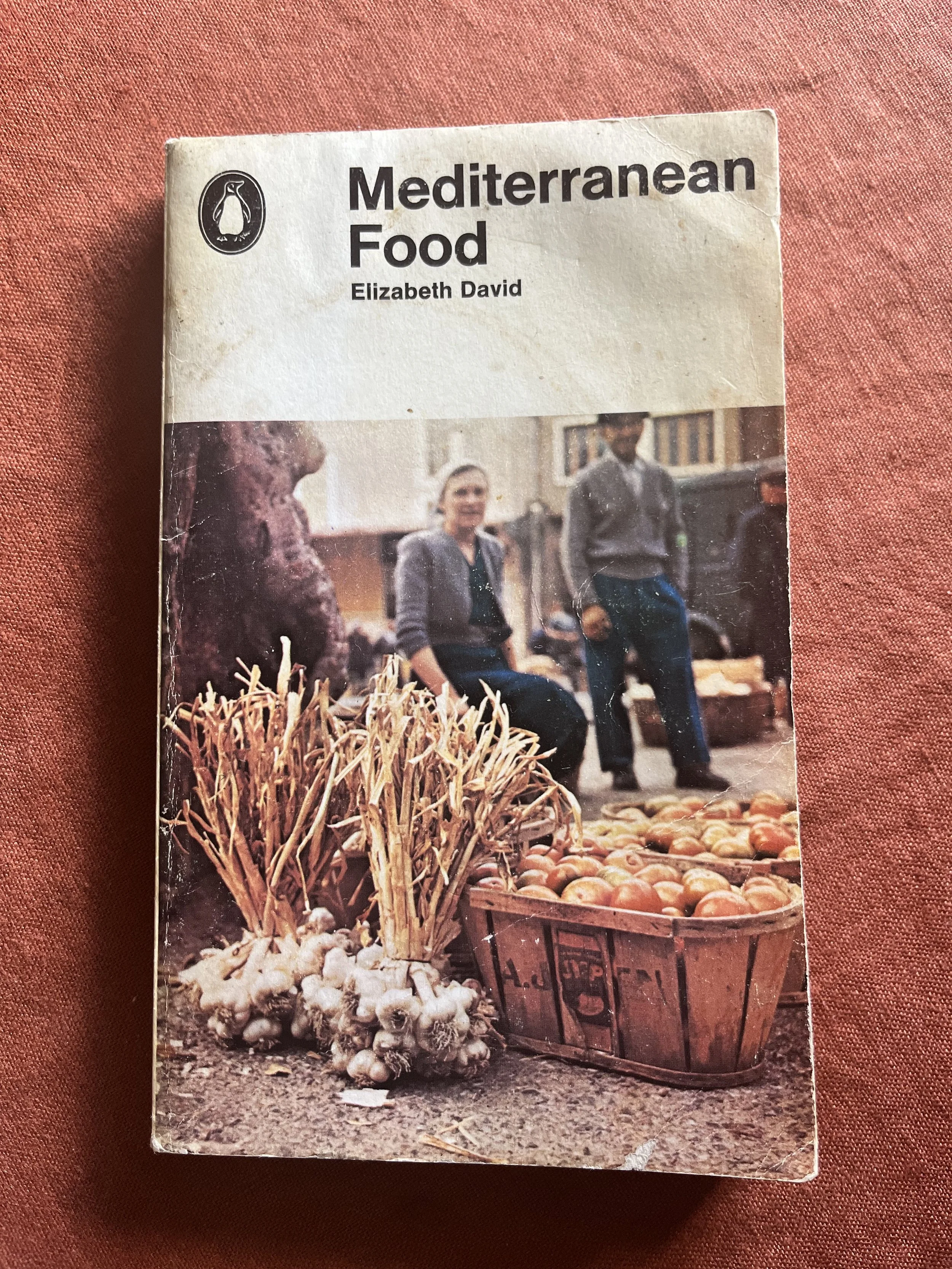The Art of Eating….
First we eat, and then we do everything else’ - MFK Fisher
Yesterday we picked 49 pears from the Bosc tree. This past week we have had to stay home and it has turned into a domestic type of week. The weather has been cooler than our normal March, generally it’s still reasonably hot at this time of the year.
I am amazed that we have so many tomatoes, in the beginning there were 200 seeds. I grew them last September from heirloom and heritage varieties that have been wonderfully abundant over the last few months. We have had more rain than sun, and long grey days, the temperature barely tip toed to thirty degrees. Friends who grew vegetables in our community are complaining that their’s are still green while mine have gone crazy, and turned wonderfully red.
I have cooked up to 50 kg by now, if not more. Indeed it has been a productive time over the last few days staying at home because our youngest daughter has the Covid and we have had to isolate. So far no one else has any signs, which is kind of good, so we got busy cleaning up the yard. Richard mowed the front lawn, the backyard, the orchard and the paddock, so it looks brand new again. Actually it looks like we are ready to sell up. Not so, maybe never.
It turns out that a good marriage is a meeting under the pear tree peeling the bird net off and slowly picking the pears. Most of the natural brown beauties are hiding under long rusty leaves. Some are as big as my hand. We pick three at a time and place them in the clothes basket. They each snap off with a click, honoured to participate. It turns out that we can be happy here in the orchard feeling abundant and victorious over the bounty. I put the basket next to the vegetable garden that I dug up a few days ago. I noticed the fave, the broad bean have already started to sprout underneath. I only planted them last week and they are peeking triumphantly through the dirt showing their green throats so fast, I am pleased. I pushed myself to clear the vegetables plot after work. Perhaps another victory on my part.
We are both delighted with our pear harvest when I realise I’ve never seen Richard eat a pear, but he tells me he wants to bottle them all, “for what”…..I ask. I rarely see him eat fruit. In my mind I plan to make jam, like I have in the past. And I think I will slice them and layer them in upside down cakes and on top of French style fruit tarts. I think, perhaps pears roasted in sugar syrup or baked in the oven, slowly in red wine with lashings of mascarpone on the side.
The art of eating begins under the pear tree, straddling the vegetable patch, wearing my old garden clogs under a radiant blue sky, at the beginning of autumn.
It turns out my week at home unable to go to work has turned into a cooking week. Instead of a writing week as first mused when we discovered we were all going to have to stay put for seven days. I have three projects on the go. Why, I don’t know. But one, the most important is to complete my book, the final edit on, In the Shadow of a Cypress, that I shared on the podcast an eon ago. I have sifted through the chapters and peppered the pages with historic relevance, checked my facts, updated my facts, and added more on how Italy has changed me over the years. How holding a place in the palm of my hand has preserved a good part of me. All I have to do is become one with my computer and In Design and it will actually be a book.
I am typing up essays from the past year on the creative life. We shall see what happens with that, and there’s always a podcast rearing its head around every sweet corner. Yes I know, I have bitten off more than I can chew. I guess I want closure in other words. And I want to go back to Italy. Italy, do I dare mention it? Or destination Arcadia as described by Helen Barolini. Barolini wrote “Italy was in incantesimo - an enchantment - that had a long drawn traveler’s to a dream of Arcadia”.
Many of us are feeling the pull, the readiness to shift gears, but things have changed once again. There are decisions to be made, some risks involved, and grief rising at the turn of global events. I know most sane people cannot believe the unfolding scenario in the Ukraine, the loss of life, the destruction. How do we reconcile this with our day to day? I wonder how long can this last?
Post note, too long…
Time to make fried zucchini blossoms, the ultimate in summer blissSo I tell myself I will make the most of the glut; the tomatoes, the zucchinis, the chillies, the pumpkins, the pears, all of it…… I tell myself, it is great to be slowing down and enjoying the good life. Did anyone every mention the good life, the slow life that some like to call it, is darned hard work? It is such a paradox.
I have been cooking from Diana Henry’s, How to Eat a Peach and Istria by Paola Bacchia. By 11am in the morning I am pouring over recipes, double checking ingredients and times to see if I have all the elements in place. Baking, indeed cooking is a bunch of beautiful elements. Looking at books and thinking about women and food, this could be a thesis I know, but something is percolating inside of me.
In all honesty, I am late to Nigella Lawson. Her work has been fascinating to me over the last few years. I know she is beloved. And I know over the past twenty years she has created many best selling books, a wide BEAUTIFUL, spectacular bookshelf of them. I do love listening to her talk about food, it always opens me. When I heard her say some time back that baking in particular, “feeds into this very human desire for transformation”. I think some what, when all else in the world is going to pot, pandemics, wars, floods and fires, when we cook, not only is it immediate gratification in a way, it also reassures us that all is well in the world. That if, I add eggs, flour, baking powder, sugar and cocoa, that something very satisfying will be in one’s life, within the hour. Think chocolate pudding or torta.
Actually I am so late to Nigella’s books I didn’t even realise Nigellissima was her Italian inspired cookbook. I knew about the book, but who knows where I have been. Reading Frances Mayes I suppose.
Recently I heard Nigella mention in a podcast, that Italy was spiritually a place she holds dear to her heart. Yes, I resonate with those words.
You know, I am glad I was late, because some how it all makes sense to me now. She is loved for her authenticity of course, but what I love is her standing in her pantry holding a jar of anchovies, or an exotic sauce, and telling us why larder staples are more than necessary, but the foundation of a good cook. Mostly, I love what it is says on the product description for Nigellissima, I read…
“This book is borne out of my love affair with Italy - one that started as a heart teen romance and has weathered the ensuing years in tact”. Hmm, I know exactly what she means.
Over here in my little world, thoughts and possibilities that have been quietly humming, the question dear Italy….. Am I ready to be transformed? Yes. Yes I am. And so I write this, musing over time and ingredients. This whole essay came about because I was thinking about women and food, and because still something is not sitting well. I realise this food thing, what am I doing? I think about women, food, and domesticity. Something is on my mind, simmering at the edges. Have we come very far as women, if I am stuck in the kitchen all day? I cannot reconcile it. My feet hurt. What am I hungry for? Is it to feed me, or to write a blog? Do people still read blogs? (send me an email if indeed you do!)
I have to cook. I have to write something. I have to wake up. The thing, I realise about Nigella, and I have heard women who have interviewed her comment on…the thing is, she has given us permission to enjoy the process of baking and cooking. And most of all the eating. In fact, revel in it if you dare to. Let ourselves delight in the flavour, the taste, the moment, the pleasure. Give ourselves the permission to enjoy our lives…
Cooking and eating is perhaps the one thing that alerts us to a moment in time. Into the now. I like that idea of revelling in food, because guilt I think, is so last decade. What is the point of it? To hold us down, to hold us back, to keep us perpetually in a haze of doubt?
With a family of five there is always something simmering away, a need. And the lovely part, the sharing at the table. Yet in a day and an age where a woman can do anything she wants to do….. I am choosing to spend those beautiful spare hours of a week at home, well cooking. Yes, dear reader I am.
Skye Mc Alpine’s, A Table in Venice cookbook….my favourite 'Burnt Sugar, Ricotta and Amaretti Cake'..... Divine to say the leastA yearning, a quieting, the giving, the sharing, and remembering a plate of food is more than a bunch of ingredients. In Massimo Bottura’s words, food is “emotional”, and mostly cooking yields calm and much needed fuel for the day. One thing all in all it has been heartening on the sidelines, watching the Instagram community bond and raise funds for #CookforUkraine. That brings it home that no matter what, food is pivotal, and goes far beyond the mere necessity to create a surplus of energy. It is ultimately a revolutionary thing that we can tap into if indeed we feel inspired.
I realise it is permission to enjoy these simple and instinctual pleasures. I realise to stop, to take the time, to muse over ingredients, to go to the market, to seek an ingredient. To make something for yourself is a revolutionary act. I like what Frances Mayes said in the Fork in the Road, “I began to see the process of cooking as an art and a practise, not a means to an end”.
I open the book The Tenth Muse: My Life in Food by the iconic Judith Jones. She shares a detail from her friend and colleague, Julia Child’s memoir - My Life in France. From the book….. “I sighed”, Julia noted in her memoir. “It just might be that THE BOOK was unpublishable … Maybe the editors were right. After all, there probably weren’t many people like me who liked to fuss around in the kitchen”.
Well it turns out Julia was right, and so her biggest fan Judith Jones. Fussing around in the kitchen is where I am at, where I always find myself, without evening realise it. If I want to feel happy and productive I go the kitchen. Over the whole time, wondering about returning to Italy over the past few years, in the middle of the pandemic when at its worst, it was through recipes and cookbooks I found my muse again.
Cooking with Paola Bacchia and her beautiful Istria CookbookSo I am searching for more tomato recipes, because we have made a lot of sauce this past few weeks. I open An Omelette and a Glass of Wine, Elizabeth David quips, “A world devoid of tomato soup, tomato sauce, tomato ketchup and tomato paste is hard to visualise”. Yes, so true for modern cuisine she is right. I find her recipes for tomato are odd choices, Tomato honey and Tomato Conserve. A French style reduction that would be jam like and enjoyed with cheese and a glass of Bordeaux. Perhaps I can find something better in her Mediterranean Cooking or David’s Italian publication. But it is good to think out of the square. Maddy and I have taken to slabs of fresh tomato on a plate with a hunk of Burrata on the side. Simply put, there is nothing better than that, or maybe a few leaves of fresh basil torn from the bunches growing in the potager, with its heady aromas of anise, liquorice, lemon. No less it is a declaration of a meal turned into art.
It is interesting that tomato paste first came onto the supermarket shelf in 1951 when the company Mutti preserved the holy ingredient and made it available in tubes thick and condensed. Although tomato paste, a version of it had been sun dried and preserved by many a European over the centuries. What was it about the fifties, that anything could be preserved in a tin for a life time. My favourite American book title of the time, The Can-Opener Gourmet Cookbook …..Thank God, Julia Child came on the scene and turned that mind set on its head.
By 1985 when David published the wonderful volume, Mediterranean Food, it is one of my favourite collections of hers, she was still musing over ingredients found on a shelf. It is true that pantry staples are vital to a good cook, but they certainly don’t have to be a way of life. And regardless, the thing that took her to the Mediterranean basin in search of food and recipes was the connection to place, the land and the seasonal fresh ingredients. It was post war Britain when she wrote the French and Italian books and people were starved for new ingredients after a long period of living off minimal fare, and food rations were still in place. And ultimately I realise what am I trying to do with all of these tomatoes? If I don’t preserve them, I lose them. And that would be a supreme waste.
The tomato is a fascinating ingredient. Its legacy is long and wide. We would be lost without it, indeed. It is fascinating that around the time of the 16th century the general belief was that tomato was in fact, a poisonous plant. It has come a long way from the Aztec culture and Mexico, to many years later arriving in the Kingdom of Sardegna, the Liguria region of Italy, as we call it today. In 1548 Cosimo de Medici received a basket of ripe fruit, tomatoes. His wife Eleanor of Toledo gave them to him as a gift. Soon the tomato would reign as the sun God of Italian cuisine. Its legacy was fate.
On the kitchen bench, there are five plates of tomatoes and one large saucepan full of cleaned, chopped, ripe ruby red pieces ready for sauce. I have my ways, I cook and freeze, I make a tomato and chilli sauce, with garlic and chilli, spices and salt. It makes for a great base for a casserole, an Indian curry, a quick pasta, or for a pizza topping. There is nothing like this sauce and it is so versatile, I have bottles, with spices, and some with just salt and sugar. In 1891 Pellegrini Artusi released his literary and cooking classic - Science in the kitchen and the Art of eating well. He was the first to put into print exactly the difference between sugo and salsa. What I make at home is similar to a sugo, in Italian sauce, although in Italian terms this will consist of a soffrito, which is made up of sautéed onion, garlic, carrot and celery that have been chopped up quite fine and then olive oil and tomato sauce it is cooked. Salsa di pomodoro is traditionally, cooking tomatoes, that are pureed into a sauce that is ready to add to other ingredients, basic and Passata like. I love that these days a self taught cook can turn into a Michelen star chef, or will perhaps go on to write a best selling cookbook.
The Italians did not invent the tomato but they certainly they did manage to figure out the best ways to use it, gastronomically speaking. Like Mina Holland the Epicuran who wrote the wonderful book, The Edible Atlas: Around the World in 39 Cuisines, in her chapter on Italy she remarked, “Italian Ingredients are integral to my daily diet”. Yes I hadn’t quite realised, they are to mine too.
Because I am a lazy gardener the pivotal turning point of staking the tomatoes has gone amiss. Now the crawl all over the ground in the weeds, the grass, getting spoilt by the dirt. I am sure I would have another bucket load if it wasn’t for this neglect. Always over the heat of the summer things start to fall away, the effort to water, to pick, to remember can be a slight burden. In Australia it is the challenge over the Christmas period, every farmer, every gardener has this problem. This period is pivotal, you either get up early and water or stand there at the end of the day a little exhausted but happy enough watching the sunset. Some people say they enjoy this past time. My favourite is to come home from work and just wander in the garden, dead heading roses, tidying and watering a few terracotta pots, making sure they stay happy. Standing for an hour watering can be hard work depending on what has happened over the day and certainly depending on what else is to be done domestically, like perhaps provide a dinner meal. And that is when I will stand there looking in the refrigerator, musing over ingredients just wishing I was done. So what do I do? I pour a glass of pinot , I eat a few roasted almonds. I ponder my bookshelf, look in a cookbook, get some aspirational mood enhancement by the colourful visuals, that perfect plating of food.
I remember I made that spicy tomato sauce, it is waiting in the fridge and yes fortunately one of our family staples in the pantry is spaghetti. I fill a silver pot with fresh water. I throw in a table spoon of salt. Salty water, just like Samin Nosrat mentioned in the Salt Fat Acid Heat series. I sip the wine and watch it bubble. I sauté an onion, and the fresh zucchini I picked out of the dirt and the weeds. I watch the olive oil sizzle on the stove top. I don’t need much, that Sugo we have spent hours of spare time labouring over is simply ready to go. I toss it in.
I open the book by the iconic Elizabeth David Mediterranean food, an ancient copy I picked up online. A second hand edition from 1965, in fact a revised edition of the original book. I like what she says about Mediterranean cooking that it is, “a blend of tradition and brilliant improvisation”. I smile at that, to me that is what I adore about Italian food, and at this time in life, to learn about. The Europeans are masters of that. I open to the chapter on Sauces. There is a wonderful quote by her old friend Norman Douglas at the front of the chapter. I sip some vino and read…..
“All culinary tasks should be performed with reverential love, don’t you think so? To say that a cook must possess the requisite outfit of culinary skills and temperament that is hardly more than saying that a soldier must appear in uniform. You can have a bad soldier in uniform. The true cook must have not only these externals, but a large dose of general worldly experience. He is the perfect blend, the only perfect blend, of artist and philosopher. He knows his worth: he holds in his palm the happiness of mankind, the welfare of generations yet unborn……If she drinks a little, why, it is all to the good. It shows that she’s fully equipped on the other side of her dual nature. It proves that she possesses the prime requisite of the artist; sensitiveness and a capacity for enthusiasm”.
By Norman Douglas
South Wind
Books Mentioned:
Nigellissima: Easy Italian Inspired Recipes: A Cookbook by Nigella Lawson
La Scienza in cucina e l’arte di mangiar bene (Science in the Kitchen and the Art of Eating Well) also referred to as “The Arts” by Pellegrino Artusi
How to Eat a Peach: Menus, Stories and Places by Diana Henry
Istria: Recipes and Stories from the Hidden Heart of Italy, Slovenia and Croatia by Paola Bacchia
The Tenth Muse: My Life in Food by Judith Jones
My Life in France by Julia Child
Their Other Side: Six American Women and the Lure of Italy by Helen Barolini
Mediterranean Cooking, An Omelette and a Glass of Wine and Italian Food by Elizabeth David
The Edible Atlas: Around the World in 39 Cuisines by Mina Holland
Salt, Fat, Acid, Heat by Samin Nosrot - Netflix Series…. “Chef and Food Writer Samin Nosrat travels around the world to demystify and explore the central principles of what makes food delicious”
Some of that home grown magic on the kitchen bench…



